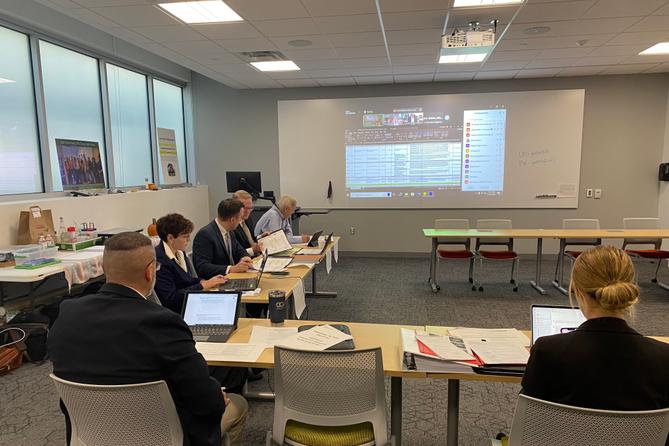Ed Mahon reported this story while participating in the USC Annenberg Center for Health Journalism’s 2024 Data Fellowship.
HARRISBURG — As local governments prepare to receive roughly $247 million more to fight the opioid epidemic, some Pennsylvania counties are fighting decisions made by a state oversight board to reject their spending plans.
The Pennsylvania Opioid Misuse and Addiction Abatement Trust board has great power to oversee the spending of potentially billions in opioid settlement money paid by companies to settle claims over their role in the opioid crisis.
The board has been criticized for rejecting a youth program in Somerset County and initiatives to support residents of Philadelphia’s Kensington neighborhood. The members’ use of private meetings to discuss what spending is allowed has also drawn criticism.
Philadelphia, for example, has alleged in a complaint that board members secretly expressed a preference for “‘just-say-no’ type strategies” when considering whether to reject the city’s plans.
The board on Nov. 21 approved distributing the next round of opioid settlement funds, which now include money from multiple new companies. The state’s distribution plan calls for the payments to go out around mid-December.
Counties and other local governments received their first opioid settlement payments in 2022, and they are supposed to spend the money in ways that align with a settlement document called Exhibit E, which describes approved and recommended strategies. The list includes medication to reverse opioid overdoses, treatment for people in jail or prison, programs that provide clean syringes to drug users, prevention programs, and opioid-related treatment.
If counties spend the money inappropriately, the trust has the power to cut future funding.
But there have been disagreements over what type of spending is appropriate, and how much discretion local governments have. A community leader in Kensington called the board’s June rejection of programs “a retraumatizing moment.”
Somerset County in southwestern Pennsylvania and Philadelphia recently appealed in Commonwealth Court decisions by the trust to reject their spending choices. Trust officials declined to comment on the appeals beyond what is said in the court filings.
A successful appeal would have a “huge impact” and could bring “some uniformity and maybe some relief for other counties,” Jaclyn Shaw, an attorney for Somerset County, told Spotlight PA.
Somerset County is challenging the trust’s decision to reject $30,000 for a youth program that the appeal describes as providing weekly opportunities for outdoor activities and mentorship. In their appeal filed in October, attorneys for Somerset County said the program is “evidence-informed” and complies with Exhibit E. They also want the trust to be forced to create standard operating procedures that allow beneficiaries to seek preapproval of their anticipated spending.
In response, attorneys for the opioid trust maintained the program isn’t compliant, argued the opioid board isn’t authorized to create a “pre-approval” process, and urged the court to deny the appeal.
Philadelphia’s appeal involves more money. It is challenging the trust’s decisions to reject millions of dollars for programs aimed at supporting residents of the Kensington area, which the city calls “the epicenter of the opioid crisis.” One contested initiative provides home repairs with the stated goal of preventing homelessness and promoting housing stability. Another supports “small businesses to prevent vacant buildings and trash-strewn lots,” the city’s appeal said.
In Philadelphia’s appeal, filed Nov. 4, attorneys for the city argued the trust’s reading of Exhibit E is too narrow, and said the city’s money is being used for evidence-informed efforts that should be permitted.
The attorneys also asked for greater clarity from Commonwealth Court, and said the state’s opioid trust should “disapprove of spending only when it is clearly unrelated to” opioid use disorder, co-occurring substance use disorder or mental health issues, overdoses, or mitigating the effects of the opioid epidemic.
There has already been back and forth over the Kensington programs. The full board rejected $7.5 million worth of resident support programs in June, but a committee of the trust later reversed some of the rejections. Philly’s appeal describes $3.4 million in money it says was wrongly denied, although figures previously released by the trust describe a lower amount.
